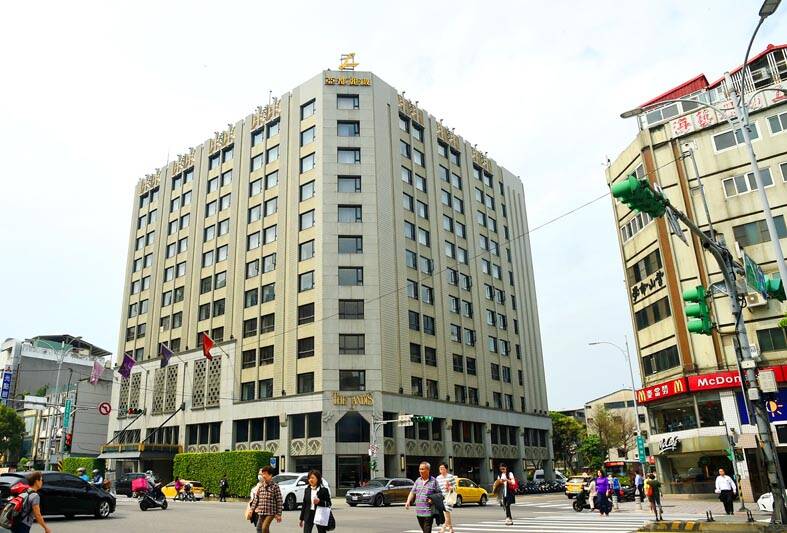Landis Hospitality Group (亞都麗緻) on Wednesday said it expects full recovery for its dining facilities next year, from 80 percent currently, but guestroom occupancy would remain low, despite COVID-19 border controls being eased.
The Taipei-based company told an online investors’ conference that its restaurant revenue this quarter returned to 80 percent of pre-pandemic levels and is expected to reach 100 percent next year.
Its Tien Hsiang Lo (天香樓) Chinese restaurant and French restaurant Paris 1930 de Hideki Takayama (巴黎廳) at the Landis Taipei Hotel (台北亞都麗緻飯店) this year won Michelin recognitions, helping to attract guests, it said.

Photo: Sung Chih-hsiung, Taipei Times
Although virus outbreaks have played havoc on hotels in Taipei, the 43-year-old group said it has no intention of tearing down its facilities and seeking urban renewal as some peers have.
The majority shareholder controls about 90 percent of the shares in circulation and is not worried about different opinions of other shareholders, the company said.
Occupancy rates have risen from 0 to 4 percent in the past two years to 10 percent following the reopening of borders last month, it said.
The group is not worried about potential labor shortages, as it has retained sufficient headcount and retired employees would help if necessary, it said.

CHIP RACE: Three years of overbroad export controls drove foreign competitors to pursue their own AI chips, and ‘cost US taxpayers billions of dollars,’ Nvidia said China has figured out the US strategy for allowing it to buy Nvidia Corp’s H200s and is rejecting the artificial intelligence (AI) chip in favor of domestically developed semiconductors, White House AI adviser David Sacks said, citing news reports. US President Donald Trump on Monday said that he would allow shipments of Nvidia’s H200 chips to China, part of an administration effort backed by Sacks to challenge Chinese tech champions such as Huawei Technologies Co (華為) by bringing US competition to their home market. On Friday, Sacks signaled that he was uncertain about whether that approach would work. “They’re rejecting our chips,” Sacks

Taiwan’s exports soared 56 percent year-on-year to an all-time high of US$64.05 billion last month, propelled by surging global demand for artificial intelligence (AI), high-performance computing and cloud service infrastructure, the Ministry of Finance said yesterday. Department of Statistics Director-General Beatrice Tsai (蔡美娜) called the figure an unexpected upside surprise, citing a wave of technology orders from overseas customers alongside the usual year-end shopping season for technology products. Growth is likely to remain strong this month, she said, projecting a 40 percent to 45 percent expansion on an annual basis. The outperformance could prompt the Directorate-General of Budget, Accounting and

NATIONAL SECURITY: Intel’s testing of ACM tools despite US government control ‘highlights egregious gaps in US technology protection policies,’ a former official said Chipmaker Intel Corp has tested chipmaking tools this year from a toolmaker with deep roots in China and two overseas units that were targeted by US sanctions, according to two sources with direct knowledge of the matter. Intel, which fended off calls for its CEO’s resignation from US President Donald Trump in August over his alleged ties to China, got the tools from ACM Research Inc, a Fremont, California-based producer of chipmaking equipment. Two of ACM’s units, based in Shanghai and South Korea, were among a number of firms barred last year from receiving US technology over claims they have

BARRIERS: Gudeng’s chairman said it was unlikely that the US could replicate Taiwan’s science parks in Arizona, given its strict immigration policies and cultural differences Gudeng Precision Industrial Co (家登), which supplies wafer pods to the world’s major semiconductor firms, yesterday said it is in no rush to set up production in the US due to high costs. The company supplies its customers through a warehouse in Arizona jointly operated by TSS Holdings Ltd (德鑫控股), a joint holding of Gudeng and 17 Taiwanese firms in the semiconductor supply chain, including specialty plastic compounds producer Nytex Composites Co (耐特) and automated material handling system supplier Symtek Automation Asia Co (迅得). While the company has long been exploring the feasibility of setting up production in the US to address